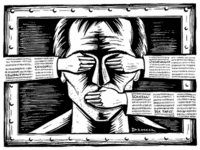 Via Bird on the Moon, an excellent article "What you can't say" by Paul Graham. Via Bird on the Moon, an excellent article "What you can't say" by Paul Graham."This essay is about heresy: how to think forbidden thoughts, and what to do with them. The latter was till recently something only a small elite had to think about. Now we all have to, because the Web has made us all publishers." Much that is quotable, and I think it is a very important subject - to notice whether we're trapped in a conformist mindset, and how we break out of it, to maybe have some original thoughts and optionally dare to speak them.The Conformist Test
Let's start with a test: Do you have any opinions that you would be reluctant to express in front of a group of your peers?
If the answer is no, you might want to stop and think about that. If everything you believe is something you're supposed to believe, could that possibly be a coincidence? Odds are it isn't. Odds are you just think whatever you're told.
The other alternative would be that you independently considered every question and came up with the exact same answers that are now considered acceptable. That seems unlikely, because you'd also have to make the same mistakes. Mapmakers deliberately put slight mistakes in their maps so they can tell when someone copies them. If another map has the same mistake, that's very convincing evidence.
Like every other era in history, our moral map almost certainly contains a few mistakes. And anyone who makes the same mistakes probably didn't do it by accident. It would be like someone claiming they had independently decided in 1972 that bell-bottom jeans were a good idea.
If you believe everything you're supposed to now, how can you be sure you wouldn't also have believed everything you were supposed to if you had grown up among the plantation owners of the pre-Civil War South, or in Germany in the 1930s-- or among the Mongols in 1200, for that matter? Odds are you would have.
Back in the era of terms like "well-adjusted," the idea seemed to be that there was something wrong with you if you thought things you didn't dare say out loud. This seems backward. Almost certainly, there is something wrong with you if you don't think things you don't dare say out loud. Most of us carry around a lot of taboos. Things we're not supposed to think or do because it somehow doesn't fit with what we think everybody else is thinking and doing. And yet many of those taboos vary greatly from place to place, culture to culture, and time to time. And, indeed, those that vary greatly in different times and places are the most suspect ones. The ones most likely to be a misunderstanding or collective insanity. But the rules of the world, including its taboos, are to a large degree what seems sensible to the people who believe them. Even what later (or elsewhere) is considered ridiculous was believed by some relatively sensible and rational people. But why does it even become necessary to have silly moral taboos and -ist labels to attach to each other? One clue:"I suspect the biggest source of moral taboos will turn out to be power struggles in which one side only barely has the upper hand. That's where you'll find a group powerful enough to enforce taboos, but weak enough to need them." Calling somebody "sexist" or "defeatist" or "divisive" or "anti-semitic" can be an effective weapon to have when you feel cornered, and you don't really have a very good case for why you're right and others are wrong, but the ruling morals happen to provide you such convenient trumps that you can use to gain leverage over others.
Anyway, absolutely brilliant article. I'll have to come back and quote more good stuff at a later time.
[ Culture | 2004-01-05 14:27 | | PermaLink ] More >
|
 Via Bird on the Moon, an excellent article "What you can't say" by Paul Graham.
Via Bird on the Moon, an excellent article "What you can't say" by Paul Graham.